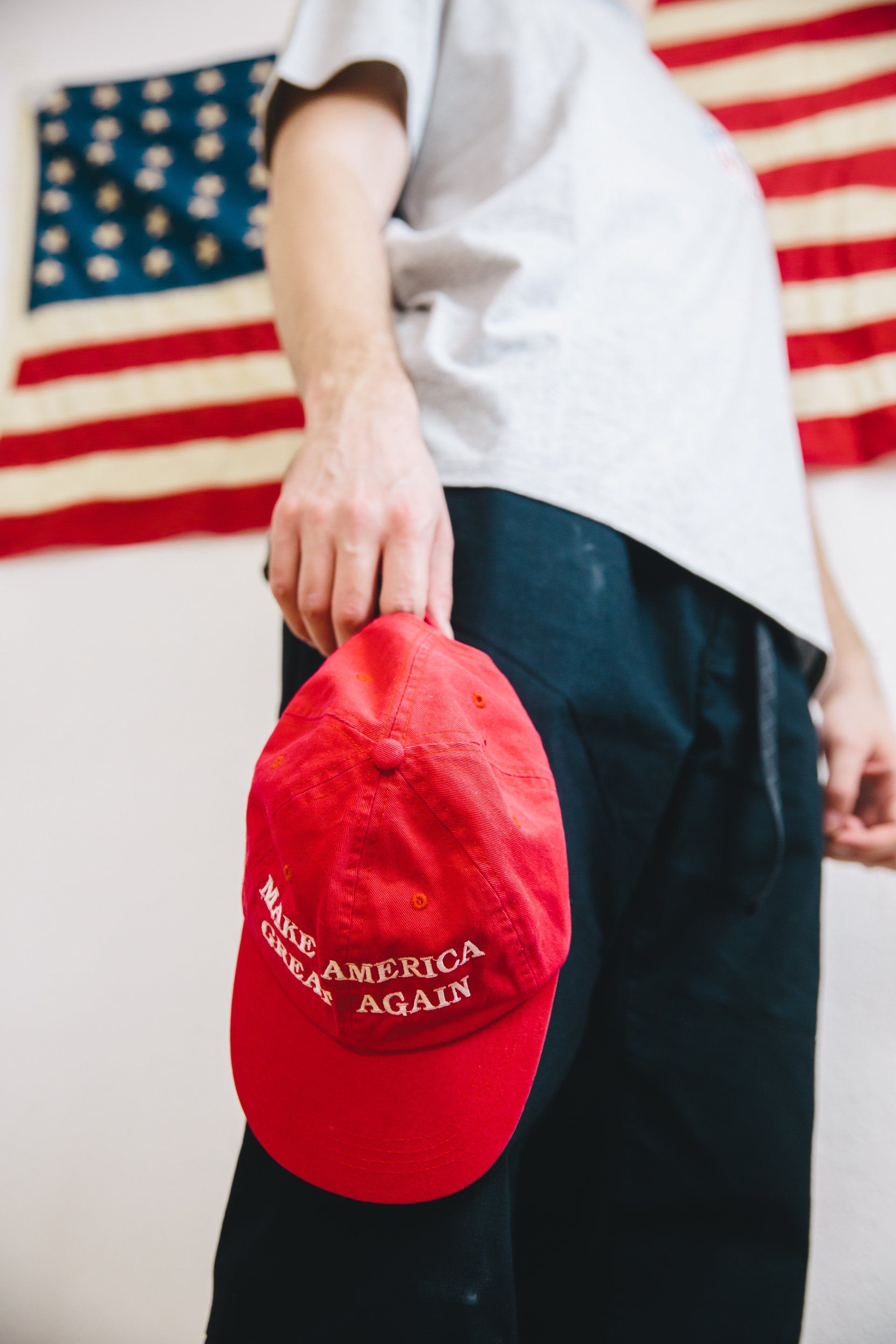Why Evangelicals voted for Trump
Dr. Gary Steward Explains why Christians overwhelmingly voted for Trump

Understanding the 2016 Election:
A Response to John Fea’s Believe Me: The Evangelical Road to Donald Trump
Dr. Gary Steward
Colorado Christian University
This post summarizes a paper that was originally read at the 2018 annual meeting of the Evangelical Theological Society (ETS) in Denver, Colorado.
I’m honored to be asked to respond to John Fea’s new book, Believe Me. I’ve never met Dr. Fea in person, but I’ve used two of his books in my upper-level history classes and have found them to be very stimulating for my students. I’m going to disagree with Dr. Fea in my response, but I’m hoping that a spirited interaction may follow that will lead to healthy camaraderie and the betterment of us all on the panel.
John Fea’s Believe Me: The Evangelical Road to Donald Trump is a very thought-provoking book. Fea seeks to advance a broad-sweeping critique of American evangelicals (white evangelicals in particular) for their support of then-candidate Donald Trump in the 2016 election. In general, Fea asserts that white evangelicals in America are motivated by ungodly fear, an unholy pursuit of worldly power, and a misplaced nostalgia for a mythical Christian America of the past that “may never have existed in the first place.” This is why they voted for Trump. These motives stem from “a long-standing evangelical approach to public life,” says Fea, that “too often gravitates toward nativism, xenophobia, racism, intolerance, and an unbiblical view of American exceptionalism” found too often in evangelical circles.[1] Fea goes so far as to indict evangelicals with putting almost Messianic-like hopes in Donald Trump as their “strongman” due to “the white evangelical politics of fear.”[2] Indeed, for Fea, white evangelicals in America have “never left” the nativism, xenophobia, and racism that was prevalent in the nineteenth century and manifest in many other parts of our nation’s history.[3]
Assessing the Trump Victory
I think that Fea is wrong to interpret white evangelicals’ support for Donald Trump in the 2016 general election as a serious indictment of the character and political outlook of white American evangelicals in general.[4] Fea describes how he was “shocked,” “saddened,” and “angry” on election night, as he was “fully expecting that…Hillary Clinton would be declared the country’s first female president.”[5] I, on the other hand, along with many evangelicals celebrated the outcome on election night. I celebrated because of my belief of what a Hillary Clinton presidency would have meant for the American society: a greater sanctioning of immorality, increased threats to religious liberty, greater lawlessness in the executive branch, and increased antagonism to Christian values in the judicial branch. Fea faults evangelicals for being blinded by prejudices and fears so that they were not able to see the positives that candidate Clinton offered. Fea points out that Clinton is “a devout mainline Methodist” who had “far more experience than Trump,” who “championed a position on paid leave that would have strengthened families,” who had “a humane immigration policy,” and who “defended the rights of women, children, the poor, and people of color.”[6] I, personally, have questions about Clinton’s piety, I wasn’t impressed by her controversial stint as Secretary of State, I disagree with her on “the rights of women,” especially when it comes to abortion, and I still don’t believe that her political policies would have strengthened families. The real positives that Hillary Clinton offered as a candidate were, in my opinion, quite few.
I think Fea is wrong to read into white evangelicals’ support for Trump at the ballot box in 2016 a general problem of ungodly fear, ungodly grasps for power, and an ahistorical nostalgia for the past. We shouldn’t jump to the conclusion that evangelicals were blinded by ungodly fears and prejudice for not agreeing with Fea’s perspective that a Clinton victory would have “strengthened families,” for example. I believe that many evangelicals ended up voting for Trump in the 2016 general election not because they believed he was the best candidate that had been offered in the 2016 election cycle, but simply because they did not want Hillary Clinton in the Oval Office. Many evangelicals who voted for Trump in the general election did not support him as their first choice in the Republican primary. Many supported him not because they were convinced he was a perfect option, but the only option in the general election who would respect evangelical morality and convictions. Fea rightly notes that “Trump never had a majority of evangelical GOP primary voters.”[7] This is true, as evangelical support was divided among a number of viable candidates. He also points out that even in the spring of 2016, when the Trump nomination because more and more likely, it was only “nearly half of GOP evangelicals” that “supported him in [the] spring’s primaries.”[8] If this is the case, isn’t it more reasonable to assume that the majority of evangelicals “settled” for Trump once he became the nominee of the Republican Party?
There are other ways for understanding evangelicals’ voting patterns in the 2016 general election than to ascribe them to ungodly fear, ungodly grasps for power, and an ahistorical nostalgia for the past. The 2016 electorate was generally disappointed with both parties. One poll taken in the spring of 2016 found that “almost 8 in 10 Americans [said] they’re dissatisfied or angry” with the federal government.[9] It was his outsider status that made him an exciting gamble against the quintessential insider, Hillary Clinton. Trump also appealed to the millions who had watched him for years on The Apprentice, where he exuded managerial competence, business savvy, and executive leadership. Many frustrated with the federal government relished the idea of him sitting at a desk in the Oval Office, saying “You’re fired!” to members of both parties.[10] His rough-and-tumble language and demeanor appealed to those who had tired of the clichés of political correctness and who desired someone who spoke more directly.[11] Clinton, on the other hand, at the time of the election was under the cloud of a federal investigation for possibly breaking federal law regarding the handling of confidential documents.[12] Mike Pence’s place on the Trump ticket, as well as the official positions of the two party platforms on issues like abortion, transgenderism, and marriage also played an important part in evangelicals’ decision to vote for the Republican ticket.[13]
Fea is right when he highlights issues like abortion and religious liberty as being reasons why many evangelicals supported Trump.[14] Trump voters knew what kind of judges Hillary Clinton would appoint to the courts, and they were hopeful that Trump might appoint justices that would bring relief to Christians like Jack Phillips and the Little Sisters of the Poor.[15] For those involved in Christian higher education, we were greatly concerned about our students’ ability to qualify for federal student aid if further executive orders mandated the acceptance of homosexuality and transgenderism. As Fea rightly observes, “With the Trump victory, Christian colleges are breathing a bit easier these days.”[16] These, and other factors, must be considered when trying to understand the thoughts and motivations behind evangelicals’ actions in helping elect Donald Trump.
“Make America Great Again” and Racism
It is my opinion that Fea is wrong to read into Trump’s campaign slogan, “Make America Great Again” an implied racism, as if the slogan implies a desire to return to America to a new period of racial oppression or discrimination.[17] After eight years of Democratic control of the White House, there was a general mood among political conservatives that America had declined in terms of international respect, military readiness, and economic greatness. The Affordable Care Act, cronyism, economic malaise, increased racial animosity, lawlessness regarding marijuana enforcement and border enforcement, the ethical corruption found in both parties, and a trampling of traditional views of marriage, family, gender, and sexuality gave many conservative voters a desire to go back in time only eight years! Perhaps some who heard it took it as a reference to “the greatest generation” and the valor of the American soldiers in defeating Nazism. Perhaps to some it evoked our national greatness in defeating the British during the American Revolution. There were probably many ways this slogan was heard. To believe that white evangelical supporters of Trump embraced this slogan generally because of a desire to return to segregation or racial discrimination is unwarranted.
Political slogans are the most useful when they are vague, which allows people to project their own hopes into them and get on board with a candidate. Just as the slogan “Hope & Change” encouraged forward-looking progressives to jump on board the Obama campaign without specifying what kinds of changes would be pursued, the slogan “Make America Great Again” encouraged conservative-minded voters to embrace the Trump campaign, hoping that some of the recent changes that took place under the Obama administration might be rolled back and undone.[18] Neither slogan need be interpreted nefariously, but as rhetorical devices and political tools of effective campaigners.
In Defense of Evangelical Political Engagement
I do believe that Fea has rightly criticized a number of high profile evangelical leaders for their inconsistency and unqualified support of president Trump. He has documented a number of statements made by evangelical leaders that are misguided and embarrassing.[19] I also share Fea’s concern that the gospel witness is blurred and compromised when church leaders become inappropriately entangled in partisan political affairs. I wouldn’t, however, want to discourage Christians who aren’t clergymen from getting involved in the political sphere in an attempt to carry out the command to “do good to all.”[20] I wouldn’t want Christians to feel like political advocacy and activism intrinsically manifest an ungodly “pursuit of worldly power.”
Fea is wrong to make a blanket criticism of white American evangelicals for getting involved in the political sphere and seeking to influence laws and legislation through the ballot box. He deems this an ungodly “quest for power” and criticizes evangelicals for “plac[ing] their hope in political candidates as a means of advancing an agenda.”[21] With the “Christian Right” approach of the 1980s in mind, Fea states that “The pursuit of politics has remained [since the 1980s] the dominant approach to winning the culture wars fostered by conservative evangelicals today.”[22] I don’t believe this is the case. If anything, conservative evangelicals in recent years have been advocating gospel clarity and an emphasis on church planting in order to save individual souls and impact the culture for Christ, as witnessed by the formation of The Gospel Coalition and Together for the Gospel, both of which are concerned with impacting the broader culture for Christ and neither of which emphasize political activism. Evangelical political activists are more the oddity today than the norm.
Even so, I don’t believe that evangelicals should withdraw from the social-political conflicts of the day. Indeed the rise and fall of kings and kingdoms has always been a matter of concern to Protestants.[23] Protestants have always been outspoken supporters or critics of political figures, viewing them in relation to the cause of Christ. The Protestant mainstream (excepting Quakers, Anabaptists, etc.) has long recognized the political affairs and kings and kingdoms are of concern to God, and should be of concern to God’s people, and an evangelical withdrawal from the political sphere would be significant deviation from our history.[24] We are instructed by our Lord himself when he says: “Behold, I am sending you out as sheep in the midst of wolves, so be wise as serpents and innocent as doves” (Matt. 10:16 ESV). We should wisely use the opportunities afforded to us to advance the cause of righteousness as well as the cause of the gospel.[25]
Fea tries to minimize the positive good that can be made through the righteous use of political power. For example, Fea argues that overturning Roe v. Wade would do very little to end abortion in America. If this were to happen, Fea says that the legality of abortion would be decided at the state level, and abortions would continue to be performed in states controlled by Democrats. Overturning Roe, says Fea, “will just make it more difficult for poor women in red states because they will have to travel to a blue state to get an abortion.” He admits that “it may curtail the number of abortions,” but he states that “it will bring our culture no closer to welcoming the children who are born and supporting their mothers.”[26] I strongly disagree with this assessment and believe that establishing legal protections for the unborn would be a significant step forward for the good of mankind.
Surprisingly, Fea goes so far as to say that evangelical involvement in the public sphere should be so limited that evangelicals should not even criticize other religions for being false or in error in public. Fea criticizes pastor Robert Jeffress for preaching to his Dallas congregation that “Every other [non-Christian] religion is an imposter, an infidel!” saying that Jeffries is guilty of conflating the church and state.[27] According to Fea, “Jeffress is correct when he says that evangelicals believe that the adherents of other religions are in error. But these are arguments we have in church, not in the public square.”[28] If Fea truly believes this, he would not only seek to keep evangelicals from political power but also from any form of prophetic witness in public as to the truth of Christ.
I think that Fea actually believes that a judicious use of political power is a positive good that Christians should see after. I don’t think he would denounce the labors of the evangelical William Wilberforce in seeking to use political power to end the trans-Atlantic slave trade through political advocacy and activism. After all, Fea commends the activism of the Civil Rights protesters who were beaten on the Edmund Pettus Bridge in Selma, Alabama, in 1965, who were seeking, among other things, political power in the form of the right to vote.[29] Such activists were seeking more than just to be a “faithful presence” in their nation. They were seeking the legitimate use of political power, and I believe they were right.
Conclusion
Dr. Fea has written a very provocative book that raises a number of important issues and question. Overall, however, I believe that Fea has erred in seeking to apply his criticism of a certain sub-culture of American evangelicalism to white evangelicals in general. Fea’s critique of evangelicals who believe that America was founded as a “Christian nation,” for example, has been published elsewhere.[30] Indeed, his animus for Barton, Jeffries, and others who hold this position comes through strongly in this volume with statements like “[David] Barton is not a historian,” “the practice of nostalgia is inherently selfish,” and “the belief that the United States is a Christian nation is a form of idolatry.”[31] I believe that Fea has wrongly attempted to apply his criticisms of a certain subset of evangelicalism to white evangelicals as a whole.
Ironically, I believe that Fea has fallen into the methodological trap that he has sometimes criticized advocates of the “Christian America” thesis with doing—of using data in an overly selective way, of prejudging historical events along narrow lines of analysis, of reading foreign meanings into historical statements, of ignoring counterfactuals, and disregarding alternative explanations. Evangelicals’ support for Trump in the 2016 election is complex and multi-faceted, and not to be narrowly ascribed to ungodly fear, an unholy pursuit of worldly power, and a misplaced nostalgia for a mythical Christian America. Some of the examples I have highlighted in this paper provide other possible avenues of interpreting the election of Donald Trump.
It is my belief that what most American evangelicals want is to “lead a peaceful and quiet life, godly and dignified in every way” (1 Tim. 2:2 ESV), free from government antagonism and inappropriate intrusion. For what they are instructed to pray for, they are also to bring about through their actions. It is not inappropriate that they do so.
[1]John Fea,
Believe Me: The Evangelical Road to Donald Trump
(Grand Rapids: Eerdmans, 2018), 6.
[2]Ibid., 8, 33, 39.
[3]Ibid., 97. Fea’s assessment shows similarities to how Hillary Clinton herself has assessed the election. Clinton has said that Donald Trump won because he “was quite successful in referencing a nostalgia that would give hope, comfort, settle grievances, for millions of people who were upset about gains that were made by others.” In elaborating on the statement, Clinton stated she was referring to “millions of white people” who “responded to [Trump’s] racial and ethnic and sexist appeals” (Marc A. Thiessen, “Commentary: Hillary, This Is the Real Reason You Lost,” Chicago Tribune, September 14, 2017, http://www.chicagotribune.com/news/opinion/commentary/ct-hillary-clinton-lost-white-voters-20170914-story.html [accessed September 6, 2018]).
[4]Fea, Believe Me, 5. Fea cites survey data that found that 81% of self-described white evangelicals voted for Trump in the 2016 general election.
[5]Ibid. Fea notes that his emotions “were less about the new president-elect and more about the large number of my fellow evangelicals who voted for him.”
[6]Ibid., 62. When Fea uses the phrase “rights of women” to refer to positive things about Clinton, I’m not sure if he has in mind her support for a so-called “right to an abortion.” To refer to Clinton as a defender of the rights of children is to completely ignore her disregard for the rights of unborn children.
[7]Ibid., 28.
[8]Ibid., 35.
[9]Tammy Webber and Emily Swanson, “Almost 80% of Americans Say They are Angry with the Federal Government,” Business Insider, April 18, 2016, https://www.businessinsider.com/ap-poll-americans-angry-with-federal-government-happy-at-home-2016-4 (accessed September 6, 2018).
[10]Paul Schrodt, “Why ‘The Apprentice’ Made Donald Trump’s Presidential Campaign Possible,” Business Insider, November 8, 2016, https://www.businessinsider.com/the-apprentice-paved-way-for-donald-trump-presidential-campaign-2016-11 (accessed, September 6, 2018).
[11]Lucian Conway, Meredith Repke, and Shannon Houck, “Donald Trump as a Cultural Revolt against Perceived Communication Restriction: Priming Political Correctness Norms Causes More Trump Support,” Journal of Social and Political Psychology 5, no. 1 (2017): 244–259; https://jspp.psychopen.eu/article/view/732/pdf (accessed September 6, 2018).
[12]Nate Silver, “The Comey Letter Probably Cost Clinton The Election,” FiveThirtyEight, May 3, 2017, https://fivethirtyeight.com/features/the-comey-letter-probably-cost-clinton-the-election/ (accessed September 6, 2018).
[13]The 2016 Democratic Party Platform and the 2016 Republican Party Platform took sharply different positions on these issues, with the Republican Party platform advocating views on marriage, gender, and abortion that resonated with evangelicals. For the Republican Party Platform, see: https://prod-cdn-static.gop.com/media/documents/DRAFT_12_FINAL%5B1%5D-ben_1468872234.pdf. For the Democratic Party Platform, see: http://www.presidency.ucsb.edu/papers_pdf/117717.pdf.
[14]Fea, Believe Me, 119.
[15]Jack Phillips’s Masterpiece Cakeshop is located at 3355 S. Wadsworth Blvd, H-117 in Lakewood, Colorado, not far downtown Denver and close to Colorado Christian University.
[16]Fea, Believe Me, 122.
[17]Ibid., 9, 135.
[18]Fea also asserts that when many conservative evangelicals heard the slogan “make America great again,” it tapped into their desires to nostalgically go back in time to the 1950s or earlier to a supposed “Christian America” (ibid., 135). Some may have projected hopes of this nature into the slogan, but such rhetoric was not generally used by Trump or his surrogates in conjunction with greatness. The rhetoric of greatness more often used by Trump was regarding economic greatness, renegotiated trade deals, and border enforcement.
[19]Ibid., 99-131.
[20]Galatians 6:10
[21]Fea, Believe Me, 7, 8.
[22]Ibid., 53. Fea quotes James Davison Hunter here as agreeing with this perspective.
[23]E.g., Samuel Davies, A Sermon Delivered at Nassau-Hall…On the Death of His Late Majesty George II (Boston: R. Draper, 1762), George Whitefield, Britain’s Mercies and Britain’s Duty (Boston: S. Kneeland and T. Green, 1746), George Whitefield, A Short Address to Persons of All Denominations Occasioned by the Alarm of an Intended Invasion (Philadelphia: B. Franklin and D. Hall, 1756).
[24]Indeed, to establish his criticism of contemporary evangelicals, Fea finds it necessary to criticize evangelicals such as Samuel Davies and Jonathan Edwards. In comparison to the political involvement of John Knox, the English Puritans, the Scottish Covenanters, and the Revolutionary-era clergymen in America, the political involvement of contemporary American evangelicals seems quite modest and mild.
[25]See Carl Henry, Uneasy Conscience of Modern Fundamentalism (Grand Rapids: Eerdmans, 1947).
[26]Fea, Believe Me, 119.
[27]Ibid., 139-40, 143.
[28]Ibid., 143.
[29]Ibid., 158-160.
[30]See John Fea, Was America Founded as a Christian Nation? (Louisville: Westminster John Knox Press, 2016) and John Fea, Why Study History? (Grand Rapids: Baker, 2013).
[31] Fea, Believe Me, 138, 141.











